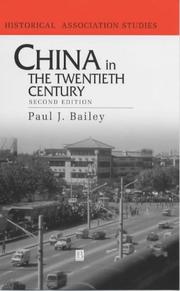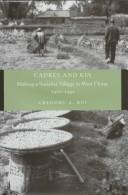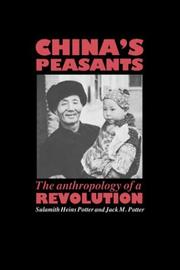| Listing 1 - 10 of 11 | << page >> |
Sort by
|
Book
Year: 1964 Publisher: Baltimore : Penguin Books,
Abstract | Keywords | Export | Availability | Bookmark
 Loading...
Loading...Choose an application
- Reference Manager
- EndNote
- RefWorks (Direct export to RefWorks)

ISBN: 0631230300 0631203281 9780631230304 9780631203285 Year: 2001 Publisher: Oxford Blackwell
Abstract | Keywords | Export | Availability | Bookmark
 Loading...
Loading...Choose an application
- Reference Manager
- EndNote
- RefWorks (Direct export to RefWorks)
Communism --- History. --- S04/0790 --- China: History--20th century, general: China --- History --- China --- Communism - China - History.
Book
Year: 1969 Publisher: Taipei, TWN : China Publishing Co.,
Abstract | Keywords | Export | Availability | Bookmark
 Loading...
Loading...Choose an application
- Reference Manager
- EndNote
- RefWorks (Direct export to RefWorks)

ISBN: 0804765189 0585053766 9780585053769 0804733775 0804735336 Year: 1998 Publisher: Stanford, Calif. Stanford University Press
Abstract | Keywords | Export | Availability | Bookmark
 Loading...
Loading...Choose an application
- Reference Manager
- EndNote
- RefWorks (Direct export to RefWorks)
Building on ethnographic research in a rural village in Sichuan, China's most populous province, this book examines changing relationships between social organization, politics, and economy during the twentieth century. Offering a wealth of empirical data on township and village life during the pre-Communist 1930’s and 1940’s, the decades of collectivism, and the present era of post-Mao reforms, the author explores the historical development of a local state regime he characterizes as managerial corporatism. Genealogies of power suggest that agnatic solidarity among selective patrilineal kin, as well as other modes of association based on marriage, ritual kinship, and personal friendship, were critical factors in the local political arena. The particularly close relationships that developed among a core group of local cadres and their kin during the Maoist years shaped the ways in which party-state policies were interpreted, implemented, and experienced by fellow villagers. These ties were also critical in orchestrating village industrialization and corporate community building in the 1980’s and 1990’s. The processes of community and elite formation entailed the mobilization of some alliances of interest, emotion, and exchange while at the same time suppressing others. The author examines strategies and patterns of interfamily cooperation and conflict during the tumultuous decades—the 1920’s-1940’s— of civil unrest, inflation, and burgeoning taxation. He shows how historical relationships between local families and officials were instrumental in shaping the reorganization of rural life under Communism. The social organization of polity and economy in Qiaolou village during the reform era bore many hallmarks of both corporate and corporatist practices. Loosened state controls enabled village cadres to create new roles for themselves as economic patrons, drawing on economic, social, political, and symbolic resources to cultivate solidarity and labor discipline within the village corporation they managed.
Communism -- China -- History -- 20th century. --- Socialism -- China -- History -- 20th century. --- Villages -- China -- Case studies. --- Villages -- China -- History -- 20th century. --- Villages --- Communism --- Socialism --- Sociology & Social History --- Social Sciences --- Social Conditions --- Hamlets (Villages) --- Village government --- Cities and towns --- Case studies --- History

ISBN: 052135787X 0521355214 0511607784 Year: 1990 Publisher: Cambridge Cambridge University press
Abstract | Keywords | Export | Availability | Bookmark
 Loading...
Loading...Choose an application
- Reference Manager
- EndNote
- RefWorks (Direct export to RefWorks)
This landmark study of Zengbu, a Cantonese community, is the first comprehensive analysis of a rural Chinese society by foreign anthropologists since the Revolution in 1949. Jack and Sulamith Potter examine the revolutionary experiences of Zengbu's peasant villagers and document the rapid changeover from Maoist to post-Maoist China. In particular, they seek to explain the persistence of the deep structure of Chinese culture through thirty years of revolutionary praxis. The authors assess the continuities and changes in rural China, moving from the traditional social organization and cultural life of the pre-revolutionary period through the series of large-scale efforts to implement planned social change which characterized Maoism - land reform, collectivization, the Great Leap Forward, and the Cultural Revolution. They examine in detail late Maoist society in 1979-80 and go on to describe and analyse the extraordinary changes of the post-Mao years, during which Zengbu was decollectivized, and traditional customs and religious practices reappeared.
Communism --- S20/0700 --- History --- China: Agriculture forestry, fishery, natural disasters--Communist land reform and agrarian policy --- China --- Rural conditions. --- Social conditions --- History. --- Peasants --- Agriculture --- Paysannerie --- Histoire --- Chine --- Rural conditions --- Conditions rurales --- 1949 --- -Communism --- China - Rural conditions. --- China - Social conditions - 1949 --- -Communism - China - History. --- Social Sciences --- Anthropology
Book
ISBN: 9780739142233 9780739142226 0739142224 0739142240 9780739142240 0739142232 1282479210 9786612479212 9781282479210 6612479213 Year: 2010 Publisher: Lanham Lexington Books
Abstract | Keywords | Export | Availability | Bookmark
 Loading...
Loading...Choose an application
- Reference Manager
- EndNote
- RefWorks (Direct export to RefWorks)
In this book an international group of scholars examines China's acceptance and ultimate rejection of Soviet models and practices in economic, cultural, social, and other realms.
Communism and culture --- Communism --- Education --- History --- China --- Soviet Union --- Politics and government --- Social conditions --- Foreign relations --- Economic conditions --- China --Economic conditions --1949-. --- China --Foreign relations --Soviet Union. --- China --Politics and government --1949-. --- China --Social conditions --1949-. --- Communism and culture --China. --- Communism --China --History --20th century. --- Education --China --History --20th century. --- Soviet Union --Foreign relations --China. --- Regions & Countries - Asia & the Middle East --- East Asia --- History & Archaeology
Book
ISBN: 9791032903810 Year: 2020 Publisher: Paris Éditions de l'Observatoire
Abstract | Keywords | Export | Availability | Bookmark
 Loading...
Loading...Choose an application
- Reference Manager
- EndNote
- RefWorks (Direct export to RefWorks)
"«La Chine n’est plus communiste» : la rumeur s’est répandue, comme une évidence. Mais ne serait-ce pas le plus grand malentendu de notre époque ? Malgré l’ouverture économique de 1978, les mesures d’internationalisation des entreprises d’État, l’établissement de relations diplomatiques avec les puissances occidentales, la Chine demeure fidèle à ses racines rouges. «Le communisme est un idéal vers lequel nous devons tous tendre» affirment aujourd’hui encore les cadres du Parti. Renforcé par l’arrivée au pouvoir de Xi Jinping en 2013, le Parti communiste chinois s’infiltre au quotidien dans toutes les strates de la société : politique et économique, bien sûr, mais aussi culturelle, artistique, éducative, sociale ou religieuse, et ambitionne d’étendre cette influence à l’international. Il fallait bien sept années d’observation et plus de 400 entretiens menés par Alice Ekman auprès de hauts cadres du Parti et fonctionnaires, diplomates, représentants d’entreprises, chercheurs et étudiants pour parvenir à comprendre la Chine contemporaine, son fonctionnement, ses évolutions récentes et sa stratégie de puissance, dans un contexte périlleux de tensions avec les États-Unis et de rapprochement avec la Russie. Car, alors que l’idéal libéral est de plus en plus contesté, la Chine cherche désormais à s’imposer comme une puissance de référence, une « solution » pour le monde, selon les propres mots de Xi Jinping, pour un jour parvenir à la « disparition ultime du capitalisme et la victoire finale du socialisme»."--Page 4 de la couverture.
BPB2006 --- communisme --- Chine --- Kitajska --- Kína --- Hiina --- China --- Čína --- An tSín --- Кина --- Kiina --- Kina --- Ķīna --- Cina --- Китай --- Chiny --- Κίνα --- Kinija --- iċ-Ċina --- Repubblica popolare cinese --- República Popular da China --- Čínská lidová republika --- Ķīnas Tautas Republika --- Λαϊκή Δημοκρατία της Κίνας --- Kínai Népköztársaság --- République populaire de Chine --- ČLR --- Народна република Китай --- Народна Република Кина --- Hiina Rahvavabariik --- Folkerepublikken Kina --- ir-Repubblika Popolari taċ-Ċina --- Republika Popullore e Kinës --- Volksrepubliek China --- НР Кина --- die Volksrepublik China --- Ljudska republika Kitajska --- Čínska ľudová republika --- Kinijos Liaudies Respublika --- Folkrepubliken Kina --- Chińska Republika Ludowa --- Republica Populară Chineză --- Narodna Republika Kina --- Kiinan kansantasavalta --- People’s Republic of China --- República Popular China --- Komuniżmu --- komunizm --- comunismo --- комунизам --- komunisms --- komunizam --- komunizmus --- kommunisme --- komunizmas --- kommunizmus --- komunismus --- kommunism --- kommunismi --- comunism --- komunizëm --- komunizem --- Kommunismus --- κομμουνισμός --- комунизъм --- Communism --- reálný socialismus --- reformní komunismus --- komunistické hnutí --- комунистичка идеологија --- реалсоцијализам --- komunistické učení --- komunistická ideologie --- komunistički režim --- anarchokomunismus --- bolševismus --- Communisme --- Relations internationales --- Programmes gouvernementaux --- Parti communiste chinois --- Politique et gouvernement --- History --- Xi, Jinping --- Zhongguo gong chan dang --- Politics and government --- Foreign relations --- Economic policy --- S06/0424 --- China: Politics and government--CCP: since 1989 --- cumannachas --- Communism - China - History - 21st century --- China - Politics and government - 2002 --- -China - Foreign relations - 21st century --- China - Economic policy - 2000 --- -Communism - China - History - 21st century --- -S06/0424
Book
ISBN: 9782200275143 2200275145 Year: 2012 Publisher: Paris Colin
Abstract | Keywords | Export | Availability | Bookmark
 Loading...
Loading...Choose an application
- Reference Manager
- EndNote
- RefWorks (Direct export to RefWorks)
Communism --- Communisme --- History --- Histoire --- Zhongguo gong chan dang --- S06/0424 --- China: Politics and government--CCP: since 1989 --- Zhongguo gong chan dang. --- Bolshevism --- Communist movements --- Leninism --- Maoism --- Marxism --- Trotskyism --- Collectivism --- Totalitarianism --- Post-communism --- Socialism --- Village communities --- Zhong guo gong chan dang --- Chung-kuo kung chʻan tang --- Chūgoku Kyōsantō --- Chungguk Kongsandang --- 中国共产党 --- 中國共產黨 --- КПК --- KPK --- Komunistická strana Číny --- Komunistička partija Kine --- Communist Party of China --- Chinese Communist Party --- Communist Party (China) --- Gong chan dang (China) --- 共产党 (China) --- Коммунистическая партия Китая --- Kommunisticheskai︠a︡ partii︠a︡ Kitai︠a︡ --- Shina Kyōsantō --- Китайска комунистическа партия --- Kitaĭska komunisticheska partii︠a︡ --- Partido Comunista de China --- PCCh --- Parti communiste chinois --- CCP --- Partito comunista cinese --- KPCh --- Kommunistische Partei Chinas --- К.П.К. --- K.P.K. --- CPC --- C.C.P. --- Partia Komuniste të Kinës --- Đảng cộng sản Trung quốc --- Zhong gong --- 中共 --- Pcc --- P.C. Chino --- ХКН --- KhKN --- Хятадын Коммунист нам --- Khi︠a︡tadyn Kommunist nam --- Communism - China - History - 21st century
Book
ISBN: 0674094751 067409476X 9780674094758 9780674094765 Year: 1969 Volume: 41 Publisher: Cambridge (Mass.): Harvard university press
Abstract | Keywords | Export | Availability | Bookmark
 Loading...
Loading...Choose an application
- Reference Manager
- EndNote
- RefWorks (Direct export to RefWorks)
S06/0222 --- S06/0421 --- S06/0422 --- S11/0470 --- #SML: Joseph Spae --- China: Politics and government--People's Republic: local and provincial government --- China: Politics and government--CCP: 1949 - 1966 --- China: Politics and government--CCP: 1966 - 1976 --- China: Social sciences--Cities: since 1949 --- Canton (China) --- Guangzhou Shi (China) --- Guangzhou (China) --- Communism --- Local government --- History --- Politics and government --- Yang-chʻeng (Guangdong Sheng, China) --- Kanton (China) --- Wu-yang chʻeng (China) --- Hui-chʻeng (China) --- Kuang-chou (Guangdong Sheng, China) --- Kwangchow (China) --- Kwangju (China) --- Guang zhou (China) --- Kouang-chou (China) --- Quảng Châu (China) --- Shengcheng (China) --- Puyün (China) --- Pʼan-yü (Guangzgou Shi, China) --- Kwang-chowfu (China) --- Fan-yü (China) --- Kuang-chou-shih (China) --- Guangzhoushi (China) --- 广州 (China) --- Communism - China - History - 20th century --- Local government - China - Case studies --- Guangzhou (China) - Politics and government --- Guangzhou Shi (China) - History --- Guangzhou Shi (China) - Politics and government
Book
ISBN: 2249611041 9782249611049 Year: 1979 Volume: 5 Publisher: Paris Namur Lethielleux Culture et vérité : Presses universitaires
Abstract | Keywords | Export | Availability | Bookmark
 Loading...
Loading...Choose an application
- Reference Manager
- EndNote
- RefWorks (Direct export to RefWorks)
Communisme --- Mao Tse-Toeng --- Mao Tsé-Toung --- Communism --- Heads of state --- Chefs d'Etat --- History --- Biography --- Histoire --- Biographie --- Mao, Zedong, --- Political and social views --- Mao, Zedong --- -Heads of state --- -323 <510> --- 141.82 <510> --- Heads of government --- Rulers --- State, Heads of --- Executive power --- Statesmen --- Bolshevism --- Communist movements --- Leninism --- Maoism --- Marxism --- Trotskyism --- Collectivism --- Totalitarianism --- Post-communism --- Socialism --- Village communities --- -Political and social views --- History. --- -Mao, Ze dong --- Mao Tse-Toung --- Mao Tsetoeng --- Mao Tsetoung --- Mao Tsetung --- Mao, Tse-Toung --- Mao, Tse-Tung --- Mau Tse-Toeng --- 毛泽东 --- 毛澤東 --- -Mao Tse-Toung --- Mao, Tsé toung --- Mao, Ze dong --- Political and social views. --- 323 <510> --- Mao, Tse-tung, --- Mao, Ze Dong, --- Maozedong, --- Mao, Zetong, --- Mao, Zhe Dong, --- Mao, Ce-tung, --- Mao, Tsetung, --- Mau, Tze-toeng, --- Mao, Tze-tung, --- Mao, Trạch Đông, --- Mao, Tsé Toung, --- Mao, T︠S︡zė-dun, --- Maočhœ̄tung, --- Mao, Čhœ̄tung, --- Mao, Čhœ̄-tung, --- Mau, Tje-tung, --- Māw, Tsī Tūngh, --- Mo, Tʻaek-tong, --- Mō, Taku-tō, --- Mō, Takutō, --- Māʼo Sétung, --- Mā, Cē Tuṅ, --- Mācētuṅ, --- 毛澤東, --- 毛泽东, --- 毛沢東, --- Mao, Yongzhi, --- Mao, Yung-chih, --- 毛詠芝, --- 毛咏芝, --- Mao, Runzhi, --- Mao, Jun-chih, --- 毛潤芝, --- 毛润芝, --- 毛润之, --- Li, Desheng, --- Li, Te-sheng, --- 李德勝, --- Shisanyazi, --- 石三伢子, --- Ershibahuasheng, --- Er shi ba hua sheng, --- Ershiba hua sheng, --- Erh shih pa hua sheng, --- 二十八画生, --- Māvō, --- Tūng, Māʼūze, --- Tse-Tung, Mao, --- Tung, Mao Tse, --- Great Helmsman, --- Heads of state - China --- Communism - China - History --- Mao Tse-toung --- Mao, Zedong - Political and social views
| Listing 1 - 10 of 11 | << page >> |
Sort by
|

 Search
Search Feedback
Feedback About UniCat
About UniCat  Help
Help News
News